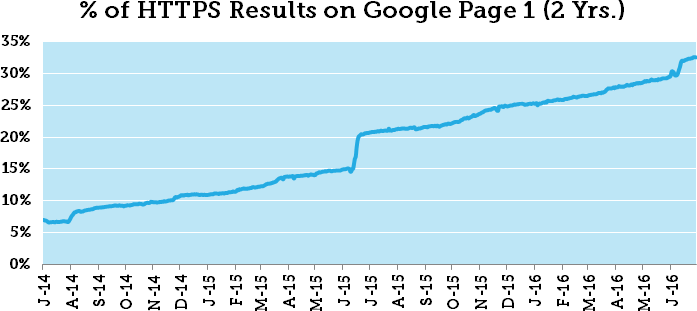HTTPS websites account for 30% of all Google search results
As of late June, 32.5% of page one Google results now use the https: protocol, according to a new study from Moz.
As of late June, 32.5% of page one Google results now use the https: protocol, according to a new study from Moz.
As of late June, 32.5% of page one Google results now use the HTTPS protocol, according to a new study from Moz.
The esteemed Dr Pete published a blog post this week on the data they’ve been tracking in the two year period since Google announced HTTPS was to be a light ranking signal in August 2014.
The results are definitely enough to give SEOs pause for thought when it comes to considering whether to switch their sites to a secure protocol.
In case you need a refresher, here is Jim Yu’s explanation of the difference between http and HTTPS:
HTTP is the standard form used when accessing websites. HTTPS adds an additional layer of security by encrypting in SSL and sharing a key with the destination server that is difficult to hack.
And here is Google’s 2014 announcement:
“We’re starting to use HTTPS as a ranking signal. For now, it’s only a very lightweight signal, affecting fewer than 1% of global queries, and carrying less weight than other signals, such as high-quality content.”
But over time, the promise that Google would strengthen the signal “to keep everyone safe on the Web” seems to be coming true…
Searchmetrics found little difference between HTTP and HTTPS rankings in the months after the initial Google announcement. Hardly surprising as it did only affect 1% of results.
Moz also saw very little initial difference. Prior to August 2014, 7% of page one Google results used HTTPS protocol. A week after the update announcement, that number increased to 8%.
So we all went about our business, some of us implemented, some of us didn’t. No big whoop. It’s not like it’s AMP or anything! Amirite?
SMASH CUT TO:
Moz has found that one-third of page one Google results now use HTTPS.

As Dr Pete points out, due to the gradual progression of the graph, this probably isn’t due to specific algorithm changes as you would normally see sharp jumps and plateaus. Instead it may mean that Google’s pro-HTTPS campaign has been working.
“They’ve successfully led search marketers and site owners to believe that HTTPS will be rewarded, and this has drastically sped up the shift.”
Projecting forward it’s likely that in 16–17 months time, HTTPS results may hit 50% and Dr Pete predicts an algorithm change to further bolster HTTPS in about a year.